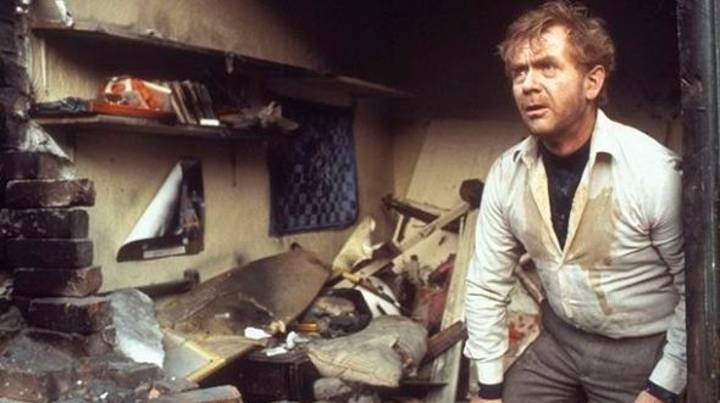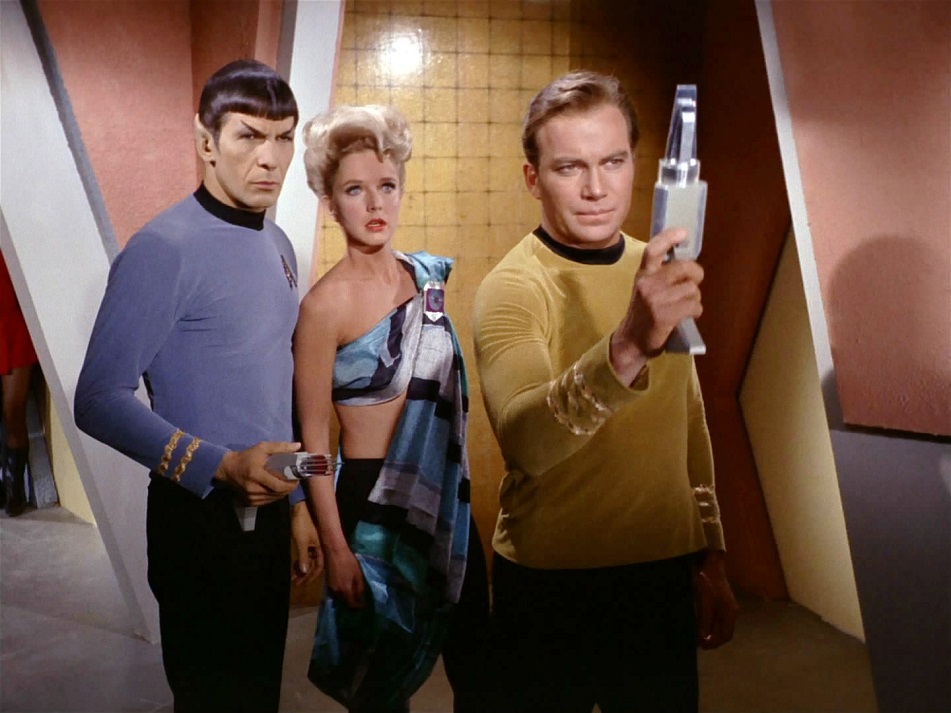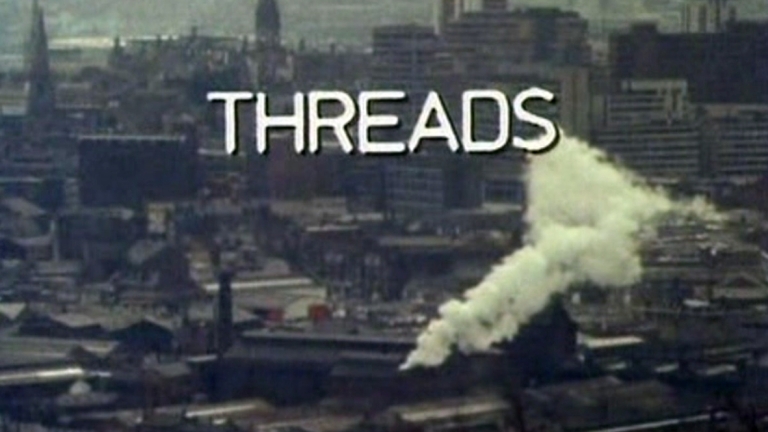I just watched the 1984 BBC docudrama Threads. In many ways, it is typical of a Cold War film at the height of the Red Scare. However, Threads created a new pinnacle of propaganda. The film’s creators deliberately terrorized an entire generation of children and skillfully blurred the lines between truth and fiction. Threads mimics real news reports, presenting a chain of events that are difficult to distinguish from real-life media, especially for a child. Despite all the praise it received in the years since then, Threads is a horrible film that teaches all the wrong lessons, and didn’t even make a nuclear war less likely. If anything, this wave of propaganda has made self-inflicted armageddon more inevitable than ever before.
Firstly, let’s look at the geopolitical situation portrayed in Threads. It’s similar to almost every other film, book, and game in the nuclear war/post-apocalypse genre, so what I say about Threads applies to most of its peers. Threads is set entirely in the UK, with exposition delivered through pseudo-news broadcasts and conversations between onscreen characters.
The Soviet Union invades Iran, the USA threatens military intervention, and its allies, including the UK. Activists who tried to protest or otherwise oppose UK’s entry into the war are rounded up and imprisoned. A few days later, a huge NATO strategic bombing mission flies into Iran. The Soviets fend the attack with a nuclear-tipped air-defense missile, destroying “many” B-52s, and the Americans retaliate with a nuclear strike that wipes out Soviet forces in Iran. Shortly afterward, a worldwide nuclear exchange begins, including missile strikes against the UK. Millions of people are killed in the initial atomic blasts, and many more are killed in the radioactive fallouts. Total economic collapse and famines plague the entire UK for decades afterward. Society degenerates into absolute barbarism, which is partially contained by martial law, including brutal executions of starving looters. Survivors are forced to work as slaves rewarded with food, as money is now worthless. People too sick or weak to work presumably die out.

At first glance, the world events in Threads seem plausible and are further reinforced by fictional exposition interlaced with real-world news footage. But they’re actually absurd, and this is one of the factors that make Threads insidious propaganda and not an honest warning against Mutually Assured Destruction. BBC wanted their viewers to believe: in a nuclear war, the Soviets would be the aggressors. I could argue for or against that narrative, but it doesn’t actually matter because an anti-war message loses all value when the “other” side is portrayed as the aggressor. We can’t control other people’s actions, only our own. So if our declared “adversaries” are going to start a war no matter what we do, what is even the point of an anti-war message? Threads actually teaches the opposite lesson it purports to. If war is inevitable, then of course the West should strike first, and harder. That’s the real geopolitical lesson of the movie.
Now compare Threads to another show aimed at children, and right around the same time. The 1983 Soviet stop-motion animation Conflict (Конфликт).
While Threads masks itself in pseudo-intellectual complexity, Conflict presents a simple and pure message. A modern war between two world powers is insanity that would inevitably end in nuclear armageddon. No matter how restrained or polite the conflict, sooner or later one side would be defeated and use their nuclear arsenal in a last-ditch attempt at self-preservation. Conflict is not only sincere, it offers a solution. If people get along and don’t have a war to begin with.
For Western examples of compelling anti-war stories, look to Star Trek: The Original Series. In the episode A Taste of Armageddon, Capt. Kirk and the crew of the Enterprise come across two planets locked in a never-ending conflict that’s gone on for 500 years. To avoid real-life destruction, bomb exchanges are simulated on supercomputers. People marked as “killed” in these simulations are then sent to incineration chambers. At the episode’s finale, Kirk destroys the planet’s supercomputer, making it impossible to honor their side of the treaty. The planet’s supreme leader despairs that the only option now is real warfare, and both planets will be devastated. Kirk points out that the opposing side, even though he’s never met them, must be equally terrified and willing to negotiate a truce.

If the events in Threads were to happen in real life, why would people in the UK consent to their own extinction? If America and Russia want to destroy each other, why not just let them? Why couldn’t the UK and the rest of Europe simply declare neutrality and refuse to take a side? The USA would complain but have no realistic way to force Europeans to help, and surely, the Russians would appreciate having fewer targets to allocate missiles to. I would think the British Broadcasting Corporation would want to instill national pride and patriotism, not portray their own country and people as pathetic pawns of a foreign empire. But that’s the fate the UK and EU have chosen for themselves. I have no explanation for this.
This theme leads into an equally concerning problem with Threads, and it is a problem shared by virtually every film in this genre. We never see the best of humanity, but rather, the worst. The British people are depicted as weak, stupid, and cowardly. They’re easily dominated by their government before, during, and after the apocalypse. They have no sense of community whatsoever, or even basic survival skills. In one scene, some of the characters eat raw meat, because apparently they’re too stupid to know that you’re supposed to cook it first. Throughout the film, British soldiers bully and casually murder people for virtually no reason at all. It’s bizarre to me, and also concerning. Fiction does influence reality, and we develop our attitudes in large part due to how we see people, role models, behave in films and literature. When the next disaster hits, regardless of whether it’s natural or manmade, I shudder to think what will happen. Will people in the West band together and use basic common sense to help each other survive, or will our societies immediately collapse into self-destruction? Hopefully that question will never need to be answered, but probability is not in our favor.
Ian Kummer

All text in Reading Junkie posts are free to share or republish without permission, and I highly encourage my fellow bloggers to do so. Please be courteous and link back to the original.
I now have a new YouTube channel that I will use to upload videos from my travels around Russia. Expect new content there soon. Please give me a follow here.
Also feel free to connect with me on Quora (I sometimes share unique articles there).



Well, apparently I will throw in my 2 cents and mention that the USSR/Russia has never had the Preemptive Strike strategy. Check the Soviet movie of the time Гостья из Будущего, very naive, for kids
I was tempted ot give my view on the Cold War, but decided against it. The message I’m trying to convey to the reader here is that regardless of the attitudes of the USSR/Russia/China/etc… an anti-war movie should be about self-reflection, not demonizing an opponent.
Well, in the ideal world the cold war would be one of those skeletons i mentioned, better let them rest undisturbed
Well, apparently I will throw in my 2 cents and mention that the USSR/Russia has never had the Preemptive Strike strategy. Check the Soviet movie of the time Гостья из Будущего, very naive, for kids
Actually, movies for kids in the USSR were never pro/about a war, unless historical. And we were not taught to hate, i dunno… nothing like that!!
One thing I will say about your movies is that I don’t think they excessively dwell on the bad things people do. I wouldn’t call it whitewashing, but rather it’s focusing on the good things. Actually, apparently a censor bureaucrat told Alexievich that she should focus on “not on how people are, but how they should be.” Apparently, she didn’t take this advice.
Actually, movies for kids in the USSR were never pro/about a war, unless historical. And we were not taught to hate, i dunno… nothing like that!!
You mean like COVID?
Well, people were practically slitting each other’s throats for the last roll of toilet paper, so yes, COVID did not make me more optimistic.
<blockquote><span>When the next disaster hits, regardless of whether it’s natural or manmade, I shudder to think what will happen. Will people in the West band together and use basic common sense to help each other survive, or will our societies immediately collapse into self-destruction? Hopefully that question will never need to be answered, but probability is not in our favor.</span></blockquote>You mean like COVID?
Well, people were practically slitting each other's throats for the last roll of toilet paper, so yes, COVID did not make me more optimistic.
One thing I will say about your movies is that I don't think they excessively dwell on the bad things people do. I wouldn't call it whitewashing, but rather it's focusing on the good things. Actually, apparently a censor bureaucrat told Alexievich that she should focus on "not on how people are, but how they should be." Apparently, she didn't take this advice.
I was tempted ot give my view on the Cold War, but decided against it. The message I'm trying to convey to the reader here is that regardless of the attitudes of the USSR/Russia/China/etc… an anti-war movie should be about self-reflection, not demonizing an opponent.
Well, in the ideal world the cold war would be one of those skeletons i mentioned, better let them rest undisturbed